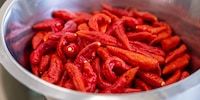
Background information
This girl is on fire! Chilli salt from Herrliberg leaves me speechless
by Darina Schweizer

According to popular opinion, glutamate as a flavour enhancer is bad for your health. As it turns out, this is based on racist assumptions and studies that have long been refuted. Nevertheless, the rumour persists.
In my post about Kewpie mayonnaise, various comments criticised the fact that glutamate is on the list of ingredients in the mayo. The flavour enhancer has a miserable reputation and is considered unhealthy, if not harmful. Glutamate allegedly causes headaches, digestive problems, palpitations and reddening of the skin. All have been scientifically refuted for decades. Nevertheless, the rumour persists.
I won’t be able to cover it any better than the German-language ZDF series MaiLab, so here’s their video, which explains everything perfectly.
Glutamate is a naturally occurring flavour enhancer. It provides that savoury umami taste to food. Alongside salty, sweet, bitter and sour, umami is the fifth taste that our tongue can perceive via its receptors. Your grandmother’s gravy or the grated Parmesan cheese on your pasta is umami – and naturally full of glutamate.
To give my fried rice that typical savoury taste, I mix in soy sauce (pure glutamate, by the way) or monosodium glutamate, a.k.a. MSG. MSG is the sodium salt form of glutamic acid – basically umami in powder form.
As with table salt, it only takes a pinch to make food tastier. Glutamic acid was synthesised for the first time by Japanese chemist Kikunae Ikeda in 1908. This also explains why pure MSG was initially particularly successful in East Asia (China and Japan) and found its way to the USA and Europe via Chinese restaurants. Concentrated glutamate had long been on tables across Switzerland and Germany at the time, but it wasn’t called that yet. Maggi seasoning began its triumphant march around the turn of the century. Its main ingredient? Glutamate, and not just a sprinkle.
Officially, it isn’t harmful whatsoever. Neither in Switzerland (page in German) nor in the EU is there a limit for the permitted daily dose of synthetically produced glutamate.
The answer to this question can be linked to a specific date.
4 April 1968
On that day, the prestigious New England Journal of Medicine published a letter in which a certain Robert Ho Man Kwok talked about feeling unwell after visiting a Chinese restaurant, connecting this to monosodium glutamate. In later editions, other readers complained about similar symptoms. There was no science behind any of this. These letters to the editor were as scientifically sound as the comments below our article.
Nevertheless, the tale of harmful glutamate quickly spread in daily newspapers, which reported on «Chinese Restaurant Syndrome». An unproven phenomenon was given a racist name and the myth was born. Various studies looking to prove glutamate was harmful followed, but all of them used dubious methods. For example, in one study mice were injected with very high doses of monosodium glutamate. In another study, people were asked whether they ever suffered symptoms such as headaches after eating in a Chinese restaurant. Both are imprecise or suggestive methods. A sugar solution, for example, can also damage cells if injected directly under the skin in high doses. And people tend to answer «Yes» to a simple question.
There are even doubts about the authenticity of author Robert Ho Man Kwok. A certain Howard Steele, claimed to have invented Ho Man Kwok, on the US radio programme This American Life. However, his claim is unproven.
This 1995 study proved that monosodium glutamate in a normal dose of up to one gramme per day has no effect on the human body. Another study suggests that monosodium glutamate had no negative effect on test subjects, even when they stated they were particularly sensitive to glutamate.
The fact is, glutamate in usual quantities isn’t harmful. It should have no effect on the health of the vast majority of people.
Glutamate may even be medically useful. Monosodium glutamate can help stimulate appetite. This could also explain why people tend to overeat in Chinese restaurants, which might explain a feeling of discomfort. Some people with histamine intolerance have also reported symptoms such as reddening of the skin after ingesting glutamate. According to their theory, glutamate acts as a histamine liberator. In other words, as a substance that can release histamine stored in the body and thus lead to allergic reactions. But again, there’s no scientific evidence to support this claim. The so-called nocebo effect could also lead to complaints. It’s the opposite of the placebo effect, where ineffective medication acts as a cure through the patient’s hope alone. With the nocebo effect, you suffer from complaints that aren’t real precisely because you’re expecting side effects.
I too was sceptical about glutamate for a long time, avoiding foods with E621 out of fear for my health. These days, I use it if a dish doesn’t already contain natural glutamate from mushrooms, tomatoes, cheese or stock. In fact, I have a salt shaker with pure glutamate in my spice drawer.
When I flew the family nest over 15 years ago, I suddenly had to cook for myself. But it wasn’t long until this necessity became a virtue. Today, rattling those pots and pans is a fundamental part of my life. I’m a true foodie and devour everything from junk food to star-awarded cuisine. Literally. I eat way too fast.
Interesting facts about products, behind-the-scenes looks at manufacturers and deep-dives on interesting people.
Show all
Background information
by Darina Schweizer

Background information
by Siri Schubert

Background information
by Moritz Weinstock